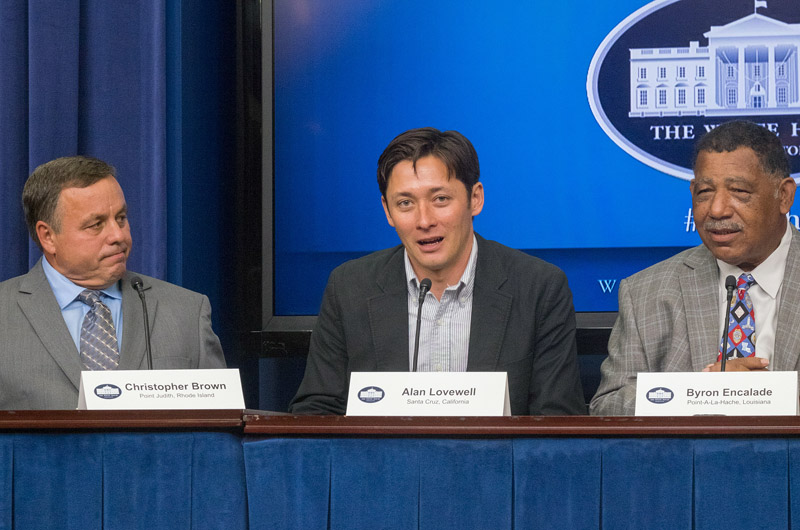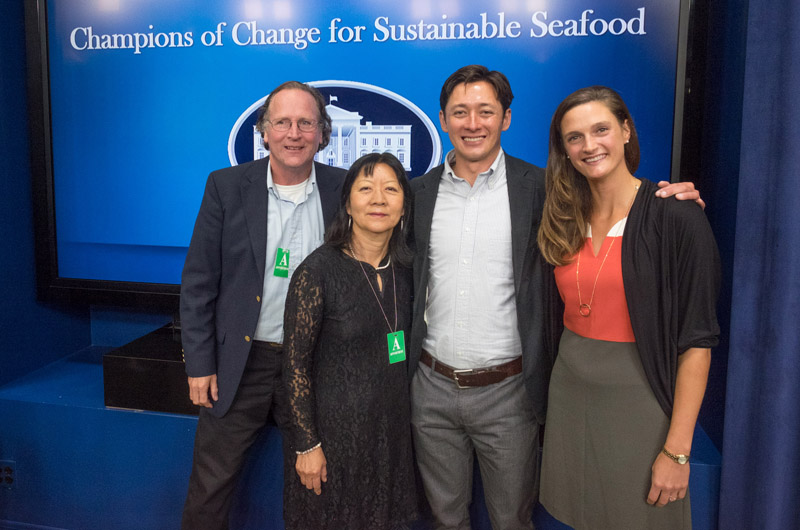Recently, my son Alan Lovewell was recognized at the White House for his work on sustainable fisheries. I have written many lead sentences in my career as a journalist, but none as special as that one.
At the White House ceremony where he was honored as a Champion of Change, Alan wasted no time in saying that he was from Martha’s Vineyard and that he’d grown up on the water and learned the ropes from real fishermen, as well as the importance of a community having locally caught fish to eat.
When he moved to California, Alan noticed that residents were eating seafood shipped in from afar, and that some species of fish landed locally, often described as “unattractive fish” was being shipped overseas. He decided to do something about this and created a community-supported fishery in Monterey, called Local Catch Monterey Bay, which quickly grew and became called Real Good Fish.
Building on success he took another step further and started Bay2Tray, a program that incorporates local seafood into public school lunch programs. He found a local abundant fish that was being discarded at sea and brought it into the school system, to not only give kids an alternative to soggy fish sticks, but to also provide a locally relevant source of food with a story and connection to the working waterfront. The program brings fishermen off their boats and into the schools to discuss their work and the importance of ocean health.
Alan grew up the son of a waterfront writer. When he was young, I took him on many of my assignments meeting with Vineyard fisherman, both commercial and recreational. As a youngster, holding a fishing rod, Alan and I saw close up the slow recovery of striped bass in our waters. He also watched with me the building of a new herring run at Lagoon Pond, and the efforts made by local draggermen to continue fishing. When he was in elementary school he joined me on a trip aboard Louis S. Larsen’s dragger Mary and Elizabeth, out of Menemsha. Today, there are no big steel fishing boats leaving from Martha’s Vineyard harbors to pursue the many species of fish that reside on Georges Bank. The offshore fleets in Edgartown, Oak Bluffs, Tisbury and Menemsha are gone.
Alan took in these early lessons and is now putting them into practice on the West Coast. He found a way to bring value back to what was caught locally and keep it local. He created new consumers by offering a subscription to its members and promising that the seafood was safe, local and sustainable. He started a newsletter on the web, telling the local fishermen’s stories and even sharing their recipes. His company now delivers seafood to consumers as far north as San Rafael, Calif, down to Carmel, a distance of 134 miles.
Many may remember reading John Steinbeck’s book Cannery Row, a story set in a time when the people of Monterey landed and canned tons of sardines daily. Soldiers fighting in both World Wars depended on it. Those sardines fed the nation. Monterey was the centerpiece of America’s need to feed itself. Two generations before Alan was born, that fishery collapsed due to overfishing, an early American story about overexploitation. A story not unlike our boom and bust whale fishery that had us traveling farther and farther away to distant shores. And a story we are always in danger of repeating today with our groundfish in the waters around Martha’s Vineyard.
Anyone growing up on Martha’s Vineyard, like my son, learns early on that Islands have to be sustainable. As a community we put a lot of energy into our conservation groups to ensure that this place is okay not just for the present, but for the generations ahead. The land and our waters, fresh and saltwater, deserve respect, above and beyond our own immediate needs as a growing community.
The good news for me and many of Alan’s friends is that we saw an Islander go to the White House to share in that heritage. Alan’s recognition and work in sustainable fisheries may take place on the West Coast, but the spirit of what he is doing can be traced nearly 100 per cent back to the Vineyard.






Comments (10)
Comments
Comment policy »